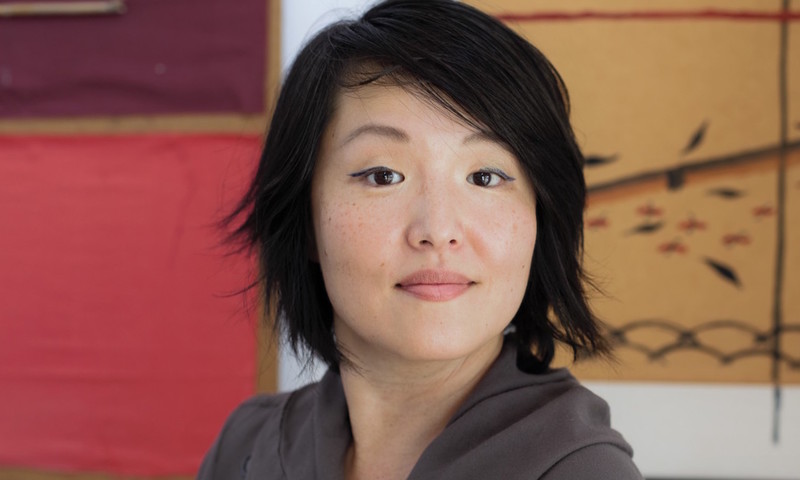Nancy Yuen is one of the many gems you might find roaming around Biolaâs campus or on the internet changing the world. Professor Yuen is a sociology professor who is passionate about diversity in film. She just published her book, Reel Inequality: Hollywood Actors and Racism, this past December. The book highlights the history of diverse actors in the film industry and the narratives of diverse actors from the industry. When I attended Nancy Yuenâs SCORR Conference workshop on under-represented actors in the film industry I was blown away by the amount of insight I gained in the short span of an hour and a half. I just had to ask her to do a Q&A for GRIT, and luckily for us, she agreed.
Q: When was the first time you saw yourself represented in either a TV show or a film?
A: I grew up in TaiwanâŠitâs so funny because Jackie Chan got the honorary best Oscar this year and I remember when I was a kid, seeing him in a drama. That was just normal. Jackie Chan was already like Arnold Schwarzenegger or Ryan Goslingâhe was already that guy when I was a little kid. I knew about Jackie Chan in all of his different ways. He was a singer, he was a pop star, he was in dramasâI didnât think of him only as the Kung Fu guy. Because thatâs not how we think of ourselves, as Asians. So, having that childhood is, to me very, valuable because even though I did grow up here, not seeing myself and still having that tension, I went back to Taiwan every summer to stay with my grandparents. So, I would always be in a country where I was the majority and consumed media where I was the majorityâwhere you could see yourself in all different types of ways.
Q: How did you get into film analysis?
 A: So, I was an immigrant as a young child. I didnât have a lot of contact with other âAmericansâ at the time. So, I just watched TV. That was like my socializing agent. I didnât have Netflix or anything, so it was just whatever was onâGilliganâs Island, followed by wrestlingâŠAnd I was seeing it as this is what America is.
A: So, I was an immigrant as a young child. I didnât have a lot of contact with other âAmericansâ at the time. So, I just watched TV. That was like my socializing agent. I didnât have Netflix or anything, so it was just whatever was onâGilliganâs Island, followed by wrestlingâŠAnd I was seeing it as this is what America is.
When I got into college I became an English major. Thatâs when I started to become more interested in discourse. And I saw film as a discourse. I worked for Blockbuster, and I was dating someone who worked for a movie theatre. So, between the two of us we saw everything. I really loved classic film and classic musicals. And it was funny, when I started seeing documentaries on how these classic movies really equate whiteness with perfection and fun and joy. I look back on my experience and Iâm like, âYeah, thatâs really true!â Because I love those films for their happiness and escapism. And I would subconsciously equate whiteness with thatâand think about people of color as always sort of just on the side, or as the villains, or the spoils of the war, as Asian women often were. Once, I started to realize that I became more critical.
When I became a sociologist I wanted to know how Hollywood worked. Secretly, I wanted to know what we can do to make a difference. And so, I became really fascinated with the cultural production side of these images of people of color.
Q: Tell us about your book Reel Inequality.
A: The book is about actors of color in the system of Hollywood. It starts off with a brief history of Hollywoodâwhere people of color have been in Hollywood, both behind the scenes and in front of the scenesâand kind of just painting just how racially homogenous Hollywood really is, drawing upon statistics and history. And then I go into why Hollywood, when itâs so âprogressive,â how does it become this terrible perpetrator of racism and sexism. And so I go into the rationales that they give in order to exclude people. So a lot of it is institutional. Itâs not just personal biases, although that comes into play. But itâs really the institution itself that is made up in a way that makes it really difficult for people of color to even just get into the door. And then I get into the stories of the actors of color. What their experiences are like, being stereotypedâŠ
And thereâs what they do to survive in Hollywood. So, I talk about the psychological rationales that they provide in order to take a role. Like, I have to survive, I have to get a paycheck, I have people to supportâŠAs well as ways to defend themselves from going crazy in terms of spiraling into a deep depression. Because what they face that white actors donât face is that the stereotypes that they play are often the stereotypes that theyâre combatting in real life. So, one person is told âgo back to your countryâ on screen, but theyâre being told stuff like that in real life too. So, thatâs an emotional cost that theyâre paying.
Q: Whatâs your favorite movie?
A: When I was young I really liked Pretty in Pink. That was before I had racial consciousness. (laughs) I just wanted a girl-centered movie. And I think I related to her because she was disadvantaged. She had a single father, and I had a single father for part of my life. So, I related to thatâI was really drawn to her independence and creativity.
Recently a favorite of mine has been Moonlight. I think I tweeted about it, that itâs the best movie Iâve seen in a decade, at least. I really related to the protagonist. Even though we came from different backgrounds, a different gender, a different sexuality. Iâm really drawn to coming-of-age stuff and young people grappling with their identities. And though Iâm not really in that stage in life, my teenage years were pretty tumultuous, and I think that a lot of my issues go back to that time. I always joke that I love every teen movie that ends in a prom. Thereâs just something about the angst that young women feel in high school about how to find self-worth and identityâI really relate to that. And Moonlight really did that for me. I think that now that Iâm more aware of racial consciousness and identity issues, I felt his struggle with trying to understand that as a child, understanding it as a teen and then repressing it because youâre not able to express it fully in the context that youâre in.

Q: Did that âracial consciousnessâ change the way you watch movies for better or worse?
A: Well, I guess it depends on how you define âbetterâ or âworse.â In terms of worse, the enjoyment of it has changed. Like, when I read Hunger Games I saw the protagonist as almost Asian, or even a Latina/Asian/brown girl in the future, racially mixedâbecause thatâs how she was described in the book. She was olive-skinned, and had gray eyes, and black hair. But that wasnât how she was portrayed in the movie. So, yeah it really takes away from the enjoyment of films when you have your critical lens on. Once youâve kind of been awakened to that critical lens itâs hard to kind of dial it back when youâre watching stuff. I just saw Beauty and the Beast. And although there were two women of color in the film, they were a drawer and a feather duster the entire time. I watched it with my daughters and I had to say at the end, âYou know it would be good to find a relationship where they donât imprison you and thereâs no violenceâŠâ I just didnât want them to think that this is how relationships are supposed to go. Whereas when I watch the animated Beauty and the Beast I donât think I had those thoughts at all as a young person.
Itâs for the worse in the sense that I canât enjoy things in the same way but itâs for the better because you want to see the entertainment industry be improved.
Q: What encouragements would you give to young writers who want to help change the industry?
A: In my book I also list programs and organizations that provide opportunities for artists of color. A lot of the major networks have that. I just went to the CBS diversity showcaseâitâs not just for actors but for writers as well. They donât advertise it as such, but they are diversity showcases, where theyâre specifically looking for underrepresented groups to give them opportunities. And the people who go to these showcases are agents, casting directors and such. Not that these are guarantees by any means, but there are opportunities.
You can buy Professor Yuenâs book, on Amazon. I also highly recommend following her on Twitter for some quality tweets.
 Biola University
Biola University




